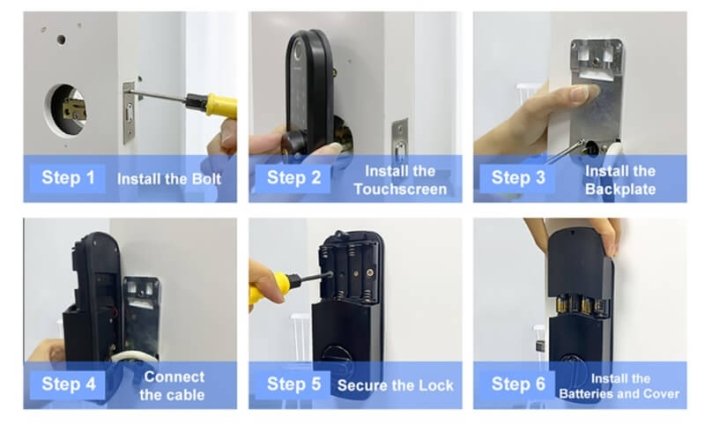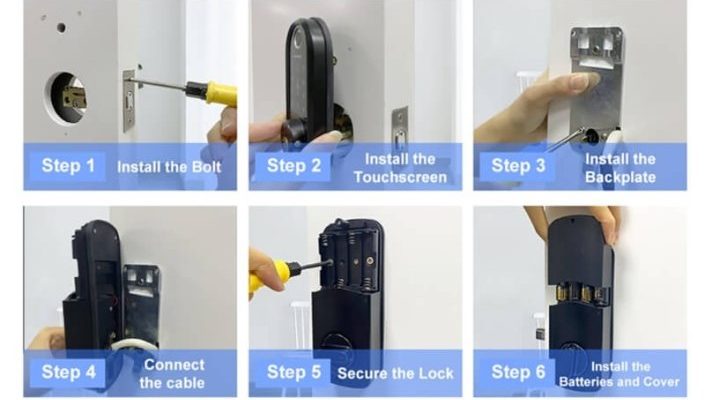
Honestly, a smart lock is supposed to make life easier, not add to your daily stress. If you’re sitting there thinking, “How can I make this thing quieter?”—you’re in the right place. Let’s go over what causes a smart lock (no matter the brand) to get noisy, and share simple steps you can try before calling support or hunting for that old key.
Why Is My Smart Lock So Loud? (Normal vs. Problem Sounds)
Here’s the thing: all smart locks make some sound. These aren’t silent gadgets—you’ll get a bit of a buzz or a gentle motor sound as they turn the deadbolt for you. But if you’re hearing aggressive grinding, a plastic-y rattle, or what sounds like the lock struggling, that’s not normal.
You might be wondering if it’s just the model of your lock. For example, Yale and August locks tend to hum softly, whereas older versions of the Schlage Encode have been known to click a bit louder. But when a lock starts making brand-new noises—a whining, high-pitched squeal, or a groan—it’s usually a sign something’s off. The problem could be physical (parts rubbing, not enough lubrication), electronic (a dying battery can change the sound), or even a problem with how the lock is mounted to your door.
Tip: Always compare your smart lock’s sound now to how it sounded when it was new. That’s your best baseline for what’s “normal.”
Check the Batteries First—It’s Surprisingly Common
Let me explain why batteries matter. You might be surprised to learn that when a smart lock’s batteries are running low, the motor has to work harder to turn the deadbolt. That leads to grinding, groaning, or that stressful slow-motion noise. Even if your app or lock’s status light says the battery is “okay,” it’s worth double-checking.
- Open your lock’s battery compartment—usually a panel on the inside.
- Swap in a set of fresh, name-brand batteries (avoid old or cheap ones).
- Don’t mix brands or types if your lock uses more than one battery.
Give it a try now. If the sound is smoother or quieter, you’ve just fixed the problem. If not, keep going—low battery is the easiest fix, but not the only one.
Inspect the Lock’s Alignment and Door Fit
Sometimes the actual problem isn’t inside the smart lock at all—it’s your door. If the deadbolt or latch isn’t perfectly lined up with the strike plate, the motor will strain to move it. That’s when you’ll hear buzzing, clicking, or the sense that the lock is “fighting” the door.
Here’s what you should do:
- Open and close the door a few times. Does it stick, or rub anywhere?
- Try locking and unlocking with the door open. Is the sound any different?
- Look for signs of wear on the deadbolt, strike plate, or door frame.
If things are out of line, you may need to adjust the strike plate (just a screwdriver needed) or wiggle the lock slightly to ensure it’s flush with the door. Even a couple millimeters can make a big difference in noise levels.
Lubricate the Lock’s Moving Parts—But Use the Right Stuff
If your smart lock sounds like a creaky old door, friction could be the issue. A little lubricant—used properly—can work wonders. But here’s where folks get tripped up: don’t use regular oil (like WD-40). Most locksmiths recommend a dry graphite lubricant or silicone-based spray.
- With the lock open, lightly spray or dust the deadbolt and moving parts—not the electronics.
- Work the lock back and forth manually to spread the lubricant.
- Wipe away any excess so it doesn’t attract dust or grime.
You’ll know you did it right if the lock moves smoother and gets quieter. If it’s still noisy, the problem might run deeper—like with the motor or gears.
Listen for Signs of Motor or Gear Problems
Not every noise points to a battery or alignment issue. Sometimes, it’s the internal motor or gearbox wearing down after years (or, let’s be honest, just a few months of heavy use). If your smart lock is new, this shouldn’t happen. But with heavy doors or stubborn deadbolts, the little motor can get tired.
Some signs you might notice:
- A high-pitched whine, like the motor is straining even with new batteries
- Irregular grinding or thumping from inside the lock, especially after a “jam” warning
- Slower-than-usual locking and unlocking cycles, or the lock stopping halfway through
At this point, you have two main options: try a full reset and re-pair the lock with your app (sometimes glitches cause odd motor behavior), or call the brand’s support line for guidance. If it’s a known gear issue (common on some Gen 1 locks), the company might even offer a replacement.
Update the Firmware or Reset the Smart Lock
You might be thinking, “Can software really make a lock louder?” Surprisingly, yes. Firmware updates can smooth out how the lock’s motor operates or fix bugs that cause weird behavior. It’s rare, but worth checking—especially if you use something like the August, Yale, or Wyze smart lock, which regularly push updates through their apps.
- Open your lock’s app and check for any pending firmware updates.
- Follow the prompts to update, making sure the lock stays powered throughout.
- If the lock is acting especially odd, try a full reset (consult the manual for ‘reset’ or ‘pair’ instructions) and re-sync it to your system.
Sometimes a reset will clear up glitches that make the motor chatter or buzz—even without any physical issues.
Compare Your Model to Others—Is It Just a “Noisy” Lock?
Let’s be honest, not all smart locks are built the same. Some models, like the Schlage Encode or older August versions, are just… a little louder by design. Maybe the manufacturer didn’t add much soundproofing, or the motor is just beefier.
If you’ve followed the steps above and your lock is still loud—but works perfectly otherwise—it might just be the model. A quick search in user forums (or even the manufacturer’s FAQ) can confirm if others have the same complaint. If absolute quiet is important to you, you may want to consider a model known for silent operation—like the Yale Assure SL, which relies on a quieter stepper motor, or a simple retro-fit smart lock with your existing deadbolt and less bulk.
Insight: The loudness of a smart lock isn’t always a flaw—sometimes it’s just “how it’s built.” If all else fails, reaching out to the brand’s support team is your best bet before swapping locks.
Should You Try a Universal vs. Brand-Specific Smart Lock?
If your current lock just won’t hush up, you might be thinking about swapping to something different. There are two main styles: universal smart locks (which retrofit onto almost any deadbolt) and brand-specific smart locks (like Yale, Schlage, or August, which often replace the entire deadbolt or set). Universal locks can be easier to install, and may let you keep your original key. Brand models, on the other hand, sometimes include more powerful motors, which can mean more noise—but also more features.
Neither style is automatically quieter, but if silence is a priority, look for models specifically described as “quiet” or “whisper-silent” in their product specs and user reviews. And whatever you choose, always check that it’ll pair and sync smoothly with your smart home setup.
Final Thoughts—Getting Your Smart Lock Back to Quiet
Dealing with a smart lock that’s too loud can make you second-guess the whole “smart home” idea—but most of the time, it’s a fixable problem. When you take things step-by-step—checking the batteries, making sure the door fits right, adding a bit of the right lubricant, updating the app, and giving your lock a good reset—you’ll usually find the culprit. Sometimes, a brand’s lock is just a little noisy out of the box, and that’s okay.
If, after everything, your lock still sounds like it’s auditioning for a robot opera, consider reaching out to the brand’s support or searching for a quieter alternative. It’s all about making technology work for you—not the other way around. Happy troubleshooting!
